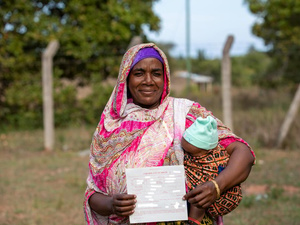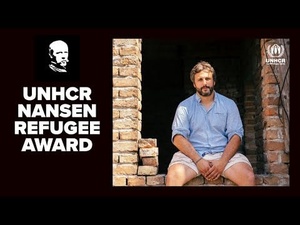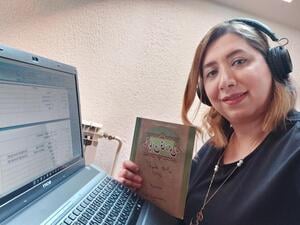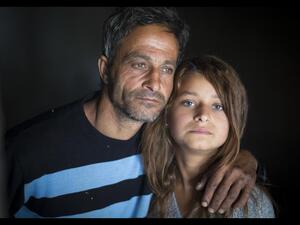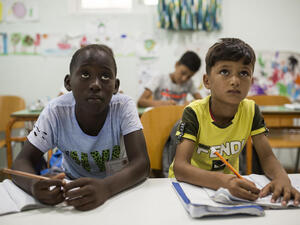Kosovo Crisis Update
Kosovo Crisis Update
Albania
On Monday, nearly 500 persons crossed the Albanian border at Morini. Some arrived in cars, others said they had been taken by bus to Prizren and were dropped off near the border. The largest group of approximately 230 refugees, virtually all of them women and children, reached Albania late Monday afternoon. They were emotionally and physically exhausted, and many burst into tears as they crossed the border. They described how fighting had broken out near their village of Dragacina, north of Prizren, forcing them to flee. Their flight lasted six days and some of the women reported incidents of physical abuse en route. A group of the men who crossed yesterday told UNHCR staff that a new wave of arrests was underway in the villages near Prizren. They reported that men between the ages of 15 and 65 had been rounded up by Serbian forces and told that they would have to do physical labour for the government.
Efforts to move refugees out of the Kukes and Krume areas in northern Albania continue. A total of 5,500 refugees, including 700 refugees from the town of Krume, were moved out on Monday to other areas in the central and southern part of the country. One camp near the town of Krume, the so-called "chicken farm," where the already bad conditions had sharply deteriorated due to heavy rains over the past week, is now nearly empty.
Many refugees have been reluctant to leave the area, not wanting to leave their tractors - their sole remaining possession - behind. UNHCR has been working with the authorities on a solution to this problem. Yesterday, in a welcome change of policy, the Albanian authorities in Kukes allowed around 600 tractors to be driven south from the Kukes area.
Nonetheless, many refugees remaining in Kukes have voiced a reluctance to move south due to rumours of insecurity and lack of accommodation in southern areas. In an attempt to encourage refugees to move, and to inform them about conditions in other parts of Albania, UNHCR is organizing "go-and-see" visits by refugee elders and leaders to prospective relocation sites in central/southern Albania. Initial visits, which will be made by helicopter, are planned today to sites at Peshkopi, Bulqize and Burrel, where accommodation is available for up to 8,000 refugees.
NATO is reinforcing logistical support in Kukes. A helicopter landing site is due for completion in the coming days, additional warehouse facilities are being prepared, and improvements are being made to roads and the transportation fleet.
UNICEF is continuing its campaign to immunize refugee children in the Kukes area. More than 16,000 refugee children have been vaccinated against measles and polio through the campaign. The programme is now being extended to local Albanian children.
FYR of Macedonia
A total of 3,500 new refugees arrived in the FYR of Macedonia on Monday. Around 2,800 came by train and more than a dozen buses which arrived at the Blace border crossing at mid-day. The train departed from Kosovo Polje and made several stops along the route, including at Lipljan, Rubovce, Babljak and Urosevac. Refugees reported that the train picked up very few additional passengers at these spots, since it was already overcrowded. The buses arrived from Urosevac. Another 800 refugees entered the FYR of Macedonia late Monday night through the border crossing at Lojane. Most of these arrivals were accommodated by local host families. Many new arrivals from Lipljan recounted stories of atrocities in and around the town.
The new arrivals at Blace yesterday were squeezed into whatever remaining space could be found in the camps, which are now seriously overcrowded. The new transit site at Blace is nearing capacity, with 2,200 already registered at the facility as of Monday morning. Capacity at the transit camp is around 2,500.
Work on the new camp at Cegrane continues. The camp is due to open on Thursday this week, with an initial capacity for up to 5,000 refugees. Construction work on the two remaining sections of the camp should bring the total camp capacity to 20,000. UNHCR is concerned, however, that the authorities' insistence that local contractors carry out the work is slowing matters down considerably.
UNHCR field staff have continued to assess the situation of refugees in the mountainous area around the small village of Mala Malina.
The registration exercise conducted by UNHCR and IOM in the refugee camps has been completed. Just over 55,000 refugees were registered in the camps as of 20 April. Mechanisms have been established to register new arrivals and the exercise is now being extended to refugees living with host families.
The need for children's schools in the camps is acute. UNICEF chaired an education co-ordination meeting with interested agencies yesterday. A new UNICEF-supported school has opened in Radusa camp and one will start soon in Bojane. Space for classrooms continues to be a critical problem, as long as the camps remain so overcrowded.
Republic of Montenegro
The security situation in Montenegro has not changed over the past few days, with tension persisting in the border areas with Kosovo but no major incidents reported. The border crossing between Montenegro and Croatia at Debeli Brijeg has remained open and visa and entry procedures are unchanged.
Displaced Kosovars have continued to move into Albania. Numbers are difficult to confirm with certainty, but the UNHCR office in Shkodra reported 500 arrivals on Monday.
UNHCR-IOM Humanitarian Evacuation Programme
The number of refugees who have left the FYR of Macedonia by air passed the 20,000 mark on Monday. In view of the overcrowded conditions in all the camps, UNHCR has welcomed the readiness of some countries to select refugees from camps other than Stankovac I and II.
On 26 April, 1,252 refugees were evacuated to Croatia, Finland, France, the Netherlands, Norway, Sweden and Turkey. Flights to Austria, Finland, France, the Netherlands, Norway and Turkey are scheduled for today.


